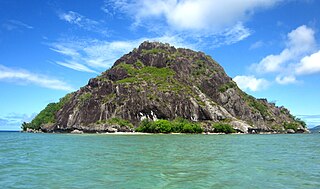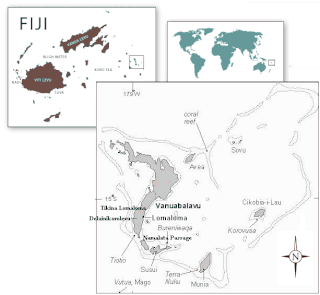
Viti Levu is the largest island in the Republic of Fiji. It is the site of the nation's capital, Suva, and home to a large majority of Fiji's population.
The House of Chiefs in Fiji consists of the Fijian nobility, composed of about seventy chiefs of various ranks, majority of which are related. It is not a formal political body and is not the same as the former Great Council of Chiefs, which was a political body with a prescribed constitutional role, although the membership of the two bodies did overlap to a great extent.

Turaga na Vunivalu na Tui Kaba, shortened as Vunivalu, is the Paramount Chief of the Kubuna Confederacy of the island of Bau in Fiji. Loosely translated the title means Warlord of Bau or "Root of War". The succession to the title does not follow primogeniture, but the candidate must be a high-ranking member of the Tui Kaba clan.

Bau is a small island in Fiji, off the east coast of the main island of Viti Levu. Bau rose to prominence in the mid-1800s and became Fiji's dominant power; until its cession to Britain, it has maintained its influence in politics and leadership right through to modern Fiji. Due to its sacred nature, foreigners have to apply for a permit to visit.
Naitasiri is one of the 14 provinces of Fiji and one of eight located on Viti Levu, Fiji's largest island. It is located in Central Division.
Namosi is one of Fiji's fourteen provinces and one of eight based in Viti Levu, the largest island. Located to the west of Suva, the province covers 570 square kilometers. Its population of 7,871 at the 2017 census was the second smallest of any Fijian province.

Ra is one of the fourteen provinces of Fiji. Occupying the northern area of Viti Levu, the largest island, it is one of eight Viti Levu-based Provinces. With a land area of 1,341 square kilometers, it had a population of 30,432 in 2017 census. The main urban centre is at Vaileka, with a population of 3,361 in 1996.

Tailevu is one of the 14 provinces of Fiji. Its capital town is Nausori, which lies along the banks of the Rewa River.
Nakorotubu is one of nineteen districts in Fiji's Ra Province. It consists of seven sub-districts or sub-regions: the five villages of Namarai, Naocobau, Nadavacia, Saioko and Verevere.

Lomaloma is a village at the south of the island of Vanua Balavu in the Lau archipelago of Fiji. The settlement is part of the tribal district of Tikina, Lomaloma and consists of 9 villages, 13 Yavusa (tribes), 42 Mataqali (clans), and 54 family units known as Tokatoka. The nine villages of Lomaloma Tikina are Lomaloma, Sawana, Susui, Narocivo, Namalata, Uruone, Levukana, Dakuilomaloma, and Tuvuca.

Drua, also known as na drua, n'drua, ndrua or waqa tabu, is a double-hull sailing boat that originated in the south-western Pacific islands. Druas do not tack but rather shunt. Both ends of each hull are identical, but the hulls are of different sizes and the smaller one is always sailed to windward. The main differences, compared to proas, are that the hulls have a symmetric U-form profile, and a second hull is used instead of an outrigger. When a float (cama) is used in place of the smaller hull, the craft is called a camakau.
The Fijian double canoe was the largest and finest sea-going vessel ever designed and built by natives of Oceania before contact with Europeans.
AdiLaufitu Malani (1958-2017) was a Fijian chief and politicians. She was a former medical assistant, a former director of UNIFEM Pacific office and a political leader. She served as a Senator from June to December 2006, when the Senate was dissolved in the wake of the military coup of 5 December.
Fijian tradition and ceremony is a living way of life that has evolved as the Fijian nation has modernised over time, with various external influences from Pacific neighbours, and the European and Asian society. This general overview of various aspects of Fijian tradition, social structure and ceremony, much of it from the Bauan Fijian tradition although there are variations from province to province, uses "Fijian" to mean indigenous Fijians or I Taukei rather than all citizens of Fiji, and the Fijian terms are most often of the Bauan dialect. Many social intricacies depend on one's inherited social position and the occasion one is confronted with: each will have a particular social etiquette.

Turaga na Rasau is a traditional Fijian chiefly title of the Lau Islands. Prior to Fiji's colonial days, Fiji had many different Vanua with their own Paramount Chieftain which exercised no authority over the other; a saying from the island of Kadavu aptly summarises it "Nomu Turaga o sega na noqu Turaga" or "Your Chief is not my Chief" also the people of Beqa Island were of a similar opinion saying "Qali Cuva Ki Lagi" or "Subject only to heaven" and would bow to no outside Chieftain, but at the turn of the 20th century aspects of the traditional social structure remained, but for administrative purposes three main Matanitu were solidified and formed as they were the dominant consolidated powers at the time being that of Kubuna, Burebasaga and Tovata. With regard to the Rasau while its traditional origins were in Kubuna on Bau the titles traditional authority in modern Fiji is now in Tovata, Lau in particular Lomaloma Tikina on the Island of Vanua Balavu.
Taukei ni Waluvu is a Fijian phrase for "Owner of the Flood." It is the traditional chiefly title of the warrior hill clan Siko-Natabutale of Nairukuruku village. The history of the clan from the mid- nineteenth century, represent the social structures of the chiefly system, religion and western culture that supported colonialism in Fiji. Tradition, Christianity and British indirect rule were combined to legitimize what was accepted as the right way to govern. Condemned by some modern day critics as exploitative, the Fijian chiefly system was the medium of native social interdependence and a traditional contract shared by the indigenous clans of pre-colonial Fiji, that was utilized for colonial rule. Since Independence the chiefly system has had to adapt to the demands of modernity. Anthropologist Arthur Capell in his study of early tribal migration within Fiji made the point that, "the history of Fiji is the history of chiefly families." The phrase in fact emphasized the hierarchical nature of Fijian traditional society where chiefly power was held sacred. The relationship between Chiefs and Westerners in especially Missionaries thus became a focal point for gathering insight into Fijian culture and tradition in the nineteenth century. James Turner a latter anthropologist found, "The chiefly families of Nairukuruku were the first in the eastern highlands of Viti Levu to declare their allegiance to the central government and as a result of this support their influence expanded throughout the area".
Buivaroro was a Fijian High Chief and Lord of the island of Nayau.
Maseikula was a Fijian High Chief. He was a Chief of the island of Nayau.
Savuto Vakadewavosa also known as Fiji's Vude Prince is a Fijian singer-songwriter. He is the co-founder of the record label Spotlight Records and he is well known for his songs "Isa My Viti", "Giving Life", "Curu Mai", "E Na Bogi", and Misunderstood, At Fiji Performing Rights Association Music Awards, the largest performing rights in the south Pacific, he has so far won Best Itaukei Song for "Curu Mai" in 2015 and Most Popular Music Video for "Misunderstood" in 2018, A collaboration with DJ Ritendra.

Verata is a tikina in Fiji's Tailevu Province. It is made up of several sub-districts or Tikina makawa, namely: Verata, Namalata, Tai, Vugalei, and Taivugalei.
In Fiji, Turaga na Roko Tui Bau is a vassal chief of the Vunivalu of Bau. From his seat at the residence of Naicobocobo, the Roko Tui Bau rules the Vusaratu chiefs and has relationships with the Roko Tui Dreketi, Ratu Mai Verata, Roko Tui Namata, Roko Tui Veikau, Tui Vuya and other members of Fiji's House of Chiefs.









